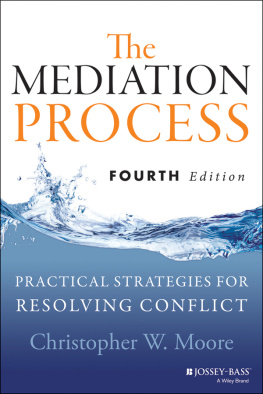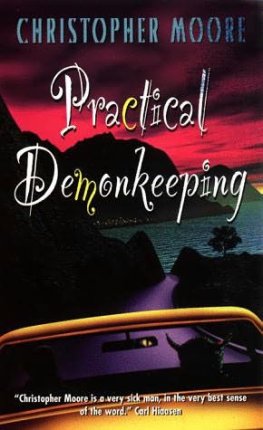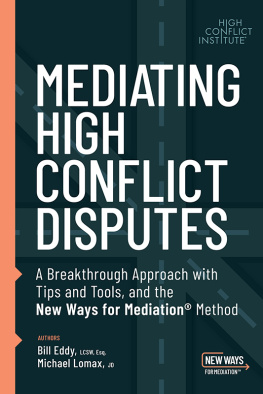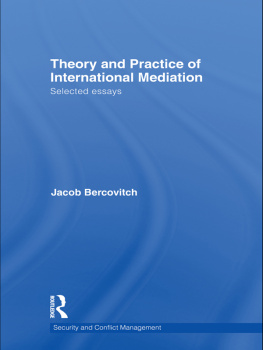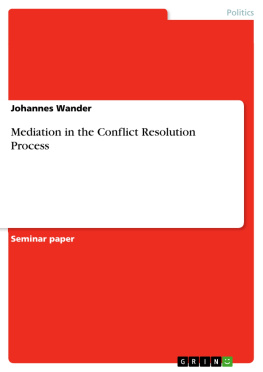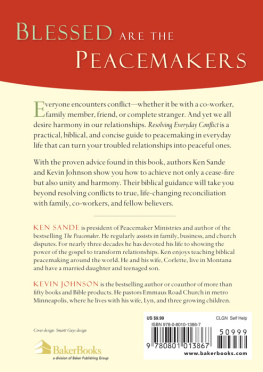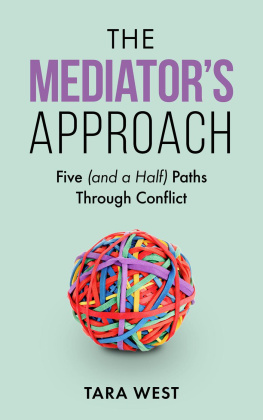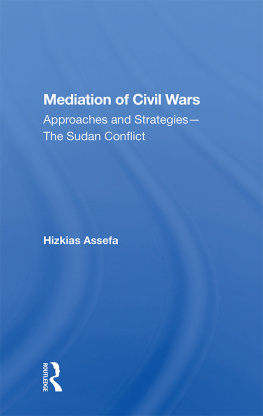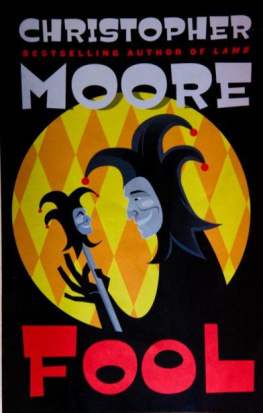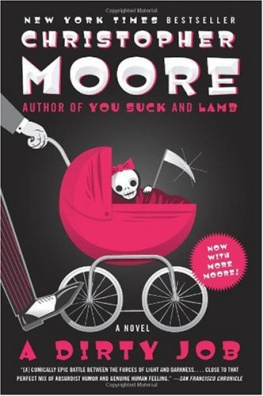Christopher W. Moore - The Mediation Process: Practical Strategies for Resolving Conflict
Here you can read online Christopher W. Moore - The Mediation Process: Practical Strategies for Resolving Conflict full text of the book (entire story) in english for free. Download pdf and epub, get meaning, cover and reviews about this ebook. year: 2014, genre: Politics. Description of the work, (preface) as well as reviews are available. Best literature library LitArk.com created for fans of good reading and offers a wide selection of genres:
Romance novel
Science fiction
Adventure
Detective
Science
History
Home and family
Prose
Art
Politics
Computer
Non-fiction
Religion
Business
Children
Humor
Choose a favorite category and find really read worthwhile books. Enjoy immersion in the world of imagination, feel the emotions of the characters or learn something new for yourself, make an fascinating discovery.
- Book:The Mediation Process: Practical Strategies for Resolving Conflict
- Author:
- Genre:
- Year:2014
- Rating:4 / 5
- Favourites:Add to favourites
- Your mark:
- 80
- 1
- 2
- 3
- 4
- 5
The Mediation Process: Practical Strategies for Resolving Conflict: summary, description and annotation
We offer to read an annotation, description, summary or preface (depends on what the author of the book "The Mediation Process: Practical Strategies for Resolving Conflict" wrote himself). If you haven't found the necessary information about the book — write in the comments, we will try to find it.
The Mediation Process: Practical Strategies for Resolving Conflict — read online for free the complete book (whole text) full work
Below is the text of the book, divided by pages. System saving the place of the last page read, allows you to conveniently read the book "The Mediation Process: Practical Strategies for Resolving Conflict" online for free, without having to search again every time where you left off. Put a bookmark, and you can go to the page where you finished reading at any time.
Font size:
Interval:
Bookmark:


Cover design by Adrian Morgan
Cover image: thinkstock
Copyright 2014 by John Wiley and Sons. All rights reserved.
Published by Jossey-Bass
A Wiley Brand
One Montgomery Street, Suite 1200, San Francisco, CA 941044594www.josseybass.com
No part of this publication may be reproduced, stored in a retrieval system, or transmitted in any form or by any means, electronic, mechanical, photocopying, recording, scanning, or otherwise, except as permitted under Section 107 or 108 of the 1976 United States Copyright Act, without either the prior written permission of the publisher, or authorization through payment of the appropriate per-copy fee to the Copyright Clearance Center, Inc., 222 Rosewood Drive, Danvers, MA 01923, 978-750-8400, fax 978-646-8600, or on the Web at www.copyright.com. Requests to the publisher for permission should be addressed to the Permissions Department, John Wiley & Sons, Inc., 111 River Street, Hoboken, NJ 07030, 201-748-6011, fax 201-748-6008, or online at www.wiley.com/go/permissions.
Limit of Liability/Disclaimer of Warranty: While the publisher and author have used their best efforts in preparing this book, they make no representations or warranties with respect to the accuracy or completeness of the contents of this book and specifically disclaim any implied warranties of merchantability or fitness for a particular purpose. No warranty may be created or extended by sales representatives or written sales materials. The advice and strategies contained herein may not be suitable for your situation. You should consult with a professional where appropriate. Neither the publisher nor author shall be liable for any loss of profit or any other commercial damages, including but not limited to special, incidental, consequential, or other damages. Readers should be aware that Internet Web sites offered as citations and/or sources for further information may have changed or disappeared between the time this was written and when it is read.
Jossey-Bass books and products are available through most bookstores. To contact Jossey-Bass directly call our Customer Care Department within the U.S. at 800-956-7739, outside the U.S. at 317-572-3986, or fax 317-572-4002.
Wiley publishes in a variety of print and electronic formats and by print-on-demand. Some material included with standard print versions of this book may not be included in e-books or in print-on-demand. If this book refers to media such as a CD or DVD that is not included in the version you purchased, you may download this material at http://booksupport.wiley.com. For more information about Wiley products, visit www.wiley.com.
Library of Congress Cataloging-in-Publication Data
Moore, Christopher W., 1947
The mediation process : practical strategies for resolving conflict / Christopher W. Moore. 4th Edition.
1 online resource.
Includes index.
Description based on print version record and CIP data provided by publisher; resource not viewed.
ISBN 978-1-118-41974-8 (pdf) ISBN 978-1-118-42152-9 (epub) ISBN 978-1-118-30430-3 (pbk.) 1. Mediation. 2. Conflict management. I. Title.
HM1126
303.6'9dc23
2014003584
For Susan, my life and professional partnerin play, learning, and peacemakingand Ben and Bess, my parents, who gave me their values and supported my aspirations throughout their lives.
All interpersonal relationships, communities, organizations, societies, and nations experience disputes or conflicts at one time or another. Conflict and disputes exist when people or groups engage in competition to achieve goals that they perceive to be, or that actually are, incompatible. Conflict is not necessarily bad, abnormal, or dysfunctional; it is a fact of life. But when it goes beyond competitive behavior and acquires the additional purpose of inflicting serious physical or psychological damage on another person or group, it is then that the negative and harmful dynamics of conflict exact their full costs.
Conflicts and disputes do not inherently have to follow a destructive course; they can lead to growth and be productive for those who are involved. Whether this happens or not often depends on the participants' ability to devise mutually acceptable procedures for cooperative problem solving, their capacity to lay aside distrust and animosity while they work together to resolve differences, and on their ability to develop solutions that satisfactorily meet their individual and common needs and interests. Many people in conflict are unable to do this on their own. They often need the help of a third party, an individual or group of people who are not directly involved in the conflict, to assist then to reach mutually acceptable solutions.
Mediation, one form of third-party assistance, has long been used to help disputants voluntarily settle their differences. It has been effectively practiced in almost all periods of history, in most cultures, and used to resolve a wide variety of types of disputes. Until relatively recently, however, there have been few works that detail what mediators actually do to aid people in conflict to reach agreements.
For the past thirty-five years, I have been actively engaged as a mediator of international, public policy, environmental, ethnic, organizational, personnel, community, and family disputes, and as a conflict management consultant, trainer, and designer of dispute resolution systems. My practice has taken me across the United States, more than fifty countries in Africa, Asia, Latin America, North America, the Middle East, Eastern and Western Europe, and the South Pacific, and to multiple indigenous communities. This broad experience has convinced me that there are some common mediation principles and procedures that can be applied effectively to help address and resolve a wide range of conflicts in many contexts and cultures. My belief has been confirmed by the expanding experience and literature in the field of mediation.
There is a continuing need for integrative how-to books on the various ways that mediation is and can be practiced. The Mediation Process: Practical Strategies for Resolving Conflict is my contribution to meet this need. It integrates the practice and research of others and my personal experience and describes some of what we have learned about the mediation process as it has been applied in diverse contexts and settings. The contents for this fourth edition have been greatly expanded and significantly rewritten since the first, second, and third editions, to encompass some of the exciting new developments and applications of mediation in the commercial, interpersonal, and public disputes arenas, and incorporate some of what I have learned about the practice of mediation in different cultures. The book outlines how mediation fits into the larger field of dispute resolution and negotiation and presents a comprehensive, stage-by-stage sequence of activities that can be used by mediators to assist disputants to reach mutually beneficial agreements.
This book has been written for several important groups of people. First are potential or practicing mediators who are or will work in a wide variety of arenas and who have repeatedly expressed a need for a comprehensive description of mediation theory and process. The book should be helpful to future or current practitioners in international, public policy, environmental, organizational, community, family, and interpersonal mediation, as well as in many other areas of practice.
Next pageFont size:
Interval:
Bookmark:
Similar books «The Mediation Process: Practical Strategies for Resolving Conflict»
Look at similar books to The Mediation Process: Practical Strategies for Resolving Conflict. We have selected literature similar in name and meaning in the hope of providing readers with more options to find new, interesting, not yet read works.
Discussion, reviews of the book The Mediation Process: Practical Strategies for Resolving Conflict and just readers' own opinions. Leave your comments, write what you think about the work, its meaning or the main characters. Specify what exactly you liked and what you didn't like, and why you think so.

